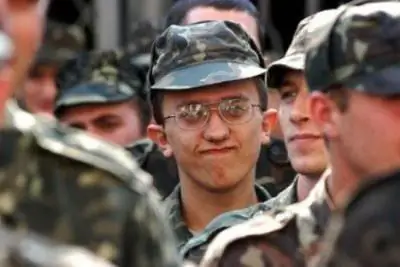- Author Matthew Elmers elmers@military-review.com.
- Public 2023-12-16 21:49.
- Last modified 2025-01-24 09:17.

Russian news agencies disseminated information that the Ministry of Defense of the Russian Federation has prepared a draft law on how to increase the attractiveness of the conscription service for young people with Russian passports. In this project, in particular, it is said that soldiers doing military service will be able to receive grants for training in state universities, and will also be provided with benefits for admission to civil service.
On the one hand, the initiative of the Ministry of Defense looks like an objective blessing, after all, it is no secret that even with a reduction in the term of conscription, the prestige of this very service, unfortunately, remains at a rather low level in the country. An honorable duty is clearly not perceived by everyone as an honorable one. In this regard, the allocation of grants for admission to universities and for education, including abroad, as well as a better position when trying to find a government position can play a very positive role.
But, as usual, there is another side to this issue. Moreover, this side can be called as mysterious as the reverse side of the Moon - in order to get a good look at it, you will have to sweat a lot, and the Ministry of Defense itself, which is somehow not very used to sweating in our country … So, the complexity of the question here is that Where will Anatoly Serdyukov and the financial part of his entire department take money for the implementation of such an ambitious project?
To understand the magnitude of the costs, the following figures can be cited. Today, a total of about 300 thousand soldiers are serving in the Russian army (autumn draft 2011 - about 140 thousand people, spring draft 2012 - about 155 thousand people). If we assume that the overwhelming majority of citizens who did not have time to get a higher education before being drafted will want to get it after serving in the army, then the allocation of monetary grants alone will cost the government of the Russian Federation a pretty penny.
Here it is still necessary to decide in what amount these grants will have to be issued. For example, the cost of a year of study at Voronezh State University (on a paid full-time department) today ranges from 40,000 ("Political Science", "Informatics and Computer Engineering", "History") to 125-130 thousand ("Electronics and Nanoelectronics", "Information systems and technologies). Part-time education at the same university is paid in the range from 21 thousand to 66, 5 thousand rubles per year. This is, let's say, a provincial university. But after all, many can express a desire to get an education exclusively in the most prestigious metropolitan universities. For example, the Bauman Moscow State Technical University offers options for paid education at a price of 60 thousand to 190 thousand rubles per year …
In other words, in order for a demobilized conscript to be able to get an education, the Ministry of Defense will have to fork out pretty much. If the prices are averaged, then it turns out that only one soldier receiving higher education will have to issue a grant for a year of study in the amount of about 80 thousand rubles (400 thousand over five years). And if you extrapolate this amount to everyone, then you can get just an astronomical result of 20 billion rubles a year (and this is again on average).
Of course, we can say that, probably, a grant from the Ministry of Defense will be issued not for a paid education option, but somewhat for other purposes, and they will have to enter demobilization universities on their own - based on the results of passing the Unified State Exam, exclusively on a free basis. But if so, then the idea of the Ministry of Defense is quite visible. Obviously, after serving in the army, one can hardly expect that a soldier will improve his performance when passing the exam - after all, in the service they do not solve trigonometric equations … And if he does not improve, then it will be much more difficult for him to enter a university. It turns out that a very small percentage of former conscripts will be able to enter universities without some kind of patronage from the state. And then, for the issuance of educational grants, a much more modest budget may be needed than the above 20 billion rubles per year. But it’s just a difficult question whether the limited possibilities of entering a higher school will become a tool for increasing the prestige of military service.
Obviously, the government wants to add some social significance to those people who honestly fulfilled their duty to the Motherland. This is gratifying. But just before talking about bills, here you need to carefully weigh all the pros and cons. After all, we all know perfectly well that we can promise so much that later it will be difficult to carry it off, but only the percentage of fulfillment of promises is still extremely low. In one case, already during the implementation of the project, it turns out that funding is running out, in the other, it turns out that the project is not at all and was not expedient. Therefore, in the case under consideration, before cheerfully applauding the decision of the Ministry of Defense to all willing conscripts to distribute grants for higher education, it is necessary to wait for real steps that will lead to a result.
After all, from a bill to the implementation of an adopted law, sometimes there is an abyss …






